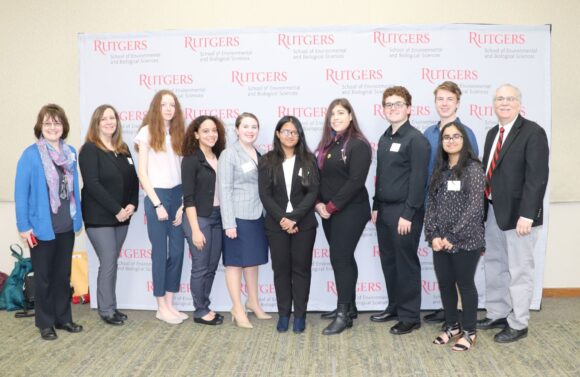 Michael Laumbach was a delegate in the New Jersey Youth Institute at the World Food Prize in 2019. He was admitted and enrolled at SEBS for fall 2020, and was also selected as a 2020 Borlaug-Ruan International Intern.
Michael Laumbach was a delegate in the New Jersey Youth Institute at the World Food Prize in 2019. He was admitted and enrolled at SEBS for fall 2020, and was also selected as a 2020 Borlaug-Ruan International Intern.
Michael spoke to the Newsroom about his experience.
Q: What did you learn at the World Food Prize and what was your reaction to being chosen as a Borlaug-Ruan International Intern?
A: The World Food Prize was such a wonderful, eye opening and frankly life-changing experience. Even if I had not been selected for the Borlaug-Ruan International Internship, what I gained from the WFP was immeasurable. It opened my eyes to the importance of sustainable agriculture, gave me new perspectives and helped me understand that really our collective future is dependent on feeding the world in an environmentally conscious manner. It allowed me to brush shoulders with the people who are revolutionizing the field and helped me to realize that was what I wanted to do in the future.
Now with that in mind you can imagine my reaction to being selected for the Borlaug-Ruan International Internship, I was ecstatic! I was more than excited to work with experts in their respective fields and knew it was going to be an opportunity which would grant me critical knowledge, experience and tools and would serve as an important step in any future career I might pursue.
Q: What was it like and what did you learn meeting with the International Livestock Research Institute scientist?
A: It was great! I met weekly with Dr. Florence Mutua, a veterinarian and epidemiologist at ILRI who not only taught me a lot about her field, but through her shared knowledge, helped me formulate and pursue an interest of mine which became the focus of my research paper – the potential impact of unorthodox livestock in a climate-constrained world, or too put it in layman’s terms, why camels are the better “cow”.
Q: Tell us about your research and the paper you are doing on camels as a livestock animal.
A: My research paper focused on camels due in no small part to the lack of research that has been done on the subject. The papers written on camels pale in comparison to other livestock animals, despite being one of the oldest domesticates, simply because, so far in human history, other livestock have done their “job” but better.
As a mount and for the purposes of milk and meat, they are often replaced by the more stereotypical cow and donkey. However, camels are going to become increasingly relevant as climate change further contributes to aridification, due to the fact that they are just the superior hardy animal for these changing conditions. They are compliments to an existing herd, resistant to drought, can produce more milk during these times, and are already being adopted in nations such as Kenya by pastoralist tribes suffering from the effects of climate change.
My paper addressed barriers to further adoption and how to best approach them. These barriers include: high costs, comparatively low birth rates, inferior meat yields, high levels of predation by African wildlife and most important the danger of under-researched camel diseases and the coronavirus strain of which camels are the main carrier: Middle Eastern Respiratory Syndrome or MERS. I was especially drawn to their status as a reservoir for MERS, and the danger that presented, despite all the good camels could provide due to the novel coronavirus pandemic still shaping our lives today.
Q: What will you do in Kenya if you are able to visit on your Spring Break?
A: If I am able to visit Kenya come spring break, I’ll be excited to meet face to face with my mentor and to get some in-the-field research. My hands-on experience with livestock is limited, and when it comes to camels, nonexistent, so it will be exciting to learn more from it, and especially conduct research relevant to my research paper.
The World Food Prize foundation was also awarded the Nobel Peace Prize this year. Rutgers School of Environmental and Biological Sciences will be hosting the 2021 the New Jersey Youth Institute at the World Food Prize on March 5th. To learn more, visit the website.


